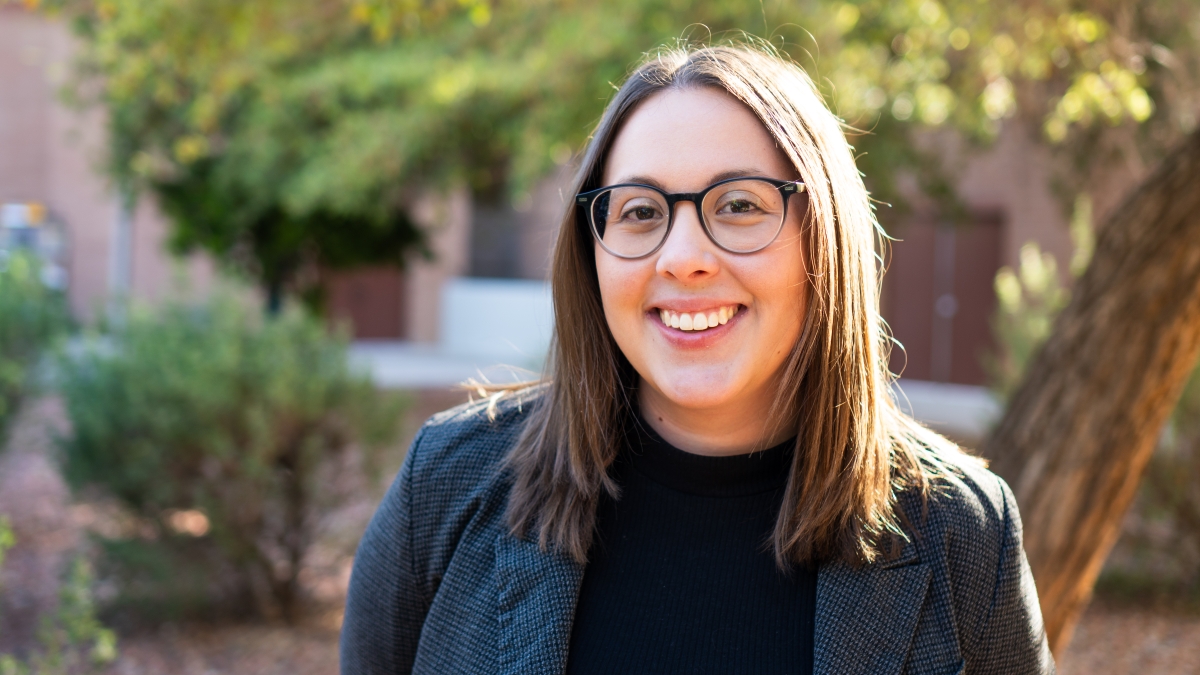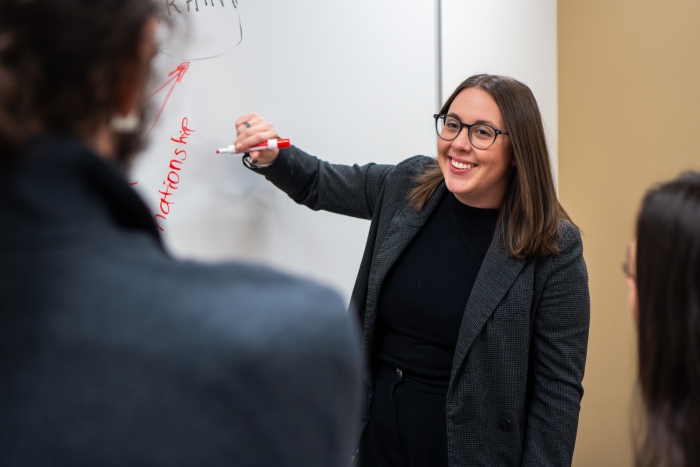Editor’s note: This story is part of a series of profiles of notable spring 2024 graduates.
Inspired by Matt Damon's survival saga in "The Martian," Alexandra Wormley found her calling in social psychology.
Fascinated by the idea that our environment shapes our thoughts and behaviors, she decided to pursue a PhD in psychology, specializing in social psychology at Arizona State University, where she will graduate this May.
Originally from Appleton, Wisconsin, Wormley earned bachelor’s degrees in psychology and history from the University of Michigan in 2020. During her first year as an ASU graduate student, Wormley was awarded a National Science Foundation’s Graduate Research Fellowship, which provided her extensive funding to focus on research and travel to various conferences.
She’s the recipient of numerous grants and awards, including the Cialdini Speaker Research Fund in 2024; the Study on Stress, Spirituality, and Health Catalyst Fund from the International Consortium on Psychosocial Stress, Spirituality, and Health; the Department of Psychology’s Daryn and Marie Linder Graduate Fellowship in Social Psychology in 2023; and both the Outstanding Research Excellence Award and the Teaching Excellence Award from ASU’s Graduate Professional Student Association in 2022.
Wormley’s research focuses on interplay of ecology, culture and religion. She is known for integrating elements of popular culture into her work and gained national recognition for launching a new ASU course about the psychology of Taylor Swift.
In June, Wormley will embark on a postdoctoral research position at the University of Michigan’s Emotion & Self-Control Lab. There, she will study culture in social media and emotion research, aligning with her broader goal of securing a faculty position to further her research, teaching and community engagement.
Read more about Wormley’s ASU experience.
Question: Why did you choose ASU?
Answer: From my freshman year of college, I wanted to go to Arizona State University. My two undergraduate mentors, Drs. Oliver Sng and Joshua Ackerman, did their PhDs at ASU. I figured, if I wanted to be like them, I should do my best to follow in their footsteps.
For what we study, we are one of the top programs in the world, and I was incredibly honored to get to study here among the greats. Additionally, we have fantastic training in quantitative methods and pedagogy. The view of the mountains and the food in Phoenix are a nice plus!
Q: Can you share more about your doctoral dissertation?
A: My dissertation looks at how ecology can explain cultural variation, and I am advised by professors Michael Varnum and Adam Cohen. In understanding why cultures differ from one another, one might consider their ecology: the social and physical features of the environment relevant to an organism’s fitness. Multiple theories propose that cultures and the individuals within them respond to the threats and opportunities offered by the ecology in predictable and adaptive ways. This dissertation demonstrates how ecology can — but does not always -— explain a significant portion of cultural variation.
The three published, first-authored, peer-reviewed articles featured in this work leverage best practices in archival data to demonstrate the relationship between ecology and cultural variation. The key takeaways? Average levels of ecology explain around 20% of the variance in culture and pathogen threat does not explain the existence of food taboos.
Q: We’ve got to talk about it — the popular Taylor Swift course — can you share more about your experience teaching the class?
A: When I got into graduate school, I never thought teaching would be the highlight of it. Teaching PSY 101: Introduction to Psychology and PSY 350: Introduction to Social Psychology was fun, but there is nothing like the Taylor Swift class. You have a group of students who are really motivated to be there and have already studied the fundamentals of psychology. That combo has led to incredible conversations about why people develop parasocial relationships with celebrities, the neuroscience underlying love, how lyrical music can distract us from studying, and, of course, the latest Taylor Swift gossip.
My students have really taken charge of creating a supportive classroom environment where we can be our authentic Swiftie selves and ask deep questions about human nature. My name may not go down in history for my research, but hopefully it will for this awesome class — and I’m truly proud of that.
Q: What professor taught you the most important lesson while at ASU?
A: We have great faculty in our social psychology area, and they have all taught me a lot. But the first lesson I had to learn at ASU wasn’t about theory or methods. I TA’ed for Professor Virginia Kwan my first semester for her Personality Psychology class. Before I gave my first lecture — ever — I practiced with Dr. Kwan. Her initial feedback was to be more confident. This goes beyond presenting. We need to have confidence in our research. We need to have confidence in our teams. We need to have confidence in our accomplishments.
Q: Could you elaborate on any specific experiential learning opportunities that significantly influenced your academic and personal growth?
A: My best experiences have been the traveling I got to do with this program. I got to spend my summers as a visiting scholar at New York University in the Social Identity and Morality Lab. I also got to participate in a summer intensive program sponsored by the Society for Personality and Social Psychology at Ohio State this summer and travel to conferences in the U.S. and abroad each year. All this traveling allowed me to meet really cool people and learn new perspectives for doing science. It helped me narrow down my own research interests but also enabled me to receive feedback on my research from outside perspectives. I also got to experience the different cultures and ecologies I study!
Q: Can you share a challenging moment during your academic journey and how you overcame it?
A: The toughest part of graduate school was being away from my support system, especially starting during the pandemic. I spent my first year at ASU without my family or my partner and did not get to meet with my classmates or professors in person. Being alone in my house for a year was really tough, but it gave me the time and space to delve into my studies. Still, it is important to build a strong, sustainable support system. I set up regular times to call my friends and family back home and made a point to come into the office once campus reopened. It may seem obvious, but the literature tells us that social support is one of the best ways to boost our mental health.
Q: What’s the best piece of advice you’d give to those still in school?
A: Always have a passion project that is just yours. As a student, you are going to have homework, applications, obligations and late nights, but you cannot lose sight of what you are doing all of it for. Even if you only get to work on it once a month, having something fun to think about and practice your newfound skills on reminds you what you are working for. Sometimes, it even turns into something!
Q: What was your favorite space on campus, whether studying, meeting friends or just thinking about life?
A: My favorite spot on campus is Charlie’s Café in Biodesign. Caffeine, and just a quick walk from the psychology building on ASU’s Tempe campus.
Q: If someone gave you $40 million to solve one problem on our planet, what would you tackle?
A: This is so nerdy, but infrastructure. My research has me thinking a lot about how our environment shapes our values, beliefs, and behaviors. One aspect of our environment is infrastructure — our roads, our waterways, our bridges, our airports, our schools, our public transit — and America has some of the worst infrastructure.
I have a theory that increasing access to public transportation, especially, would solve issues related to carbon pollution, employment and mental health — to name a few. Forty million would not be able to fully address the issue, but if we could conduct an experiment to demonstrate the benefits of simple repairs to infrastructure I think we would see some remarkable outcomes.
More Sun Devil community

ASU students receive $25,000 scholarships from NBA legend Magic Johnson
By Henry Smardo Serenity Reynolds Cronkite student Serenity Reynolds balances classes, homework, clubs, internships and jobs, and tuition is always top of mind. She…

ASU Accessibility Awareness Day advocates for a more inclusive digital future
By Jonathan CrowellAs technology continues to drive learning and research innovations, so do efforts to ensure digital products and environments are accessible by all.Last week, Arizona State…

ASU student, Navy vet pursues greener future in sustainability
As Arizona State University holds its annual Salute to Service celebration, honoring individuals who serve the nation and their communities, Shana Harly stands out for her commitment to both her…

